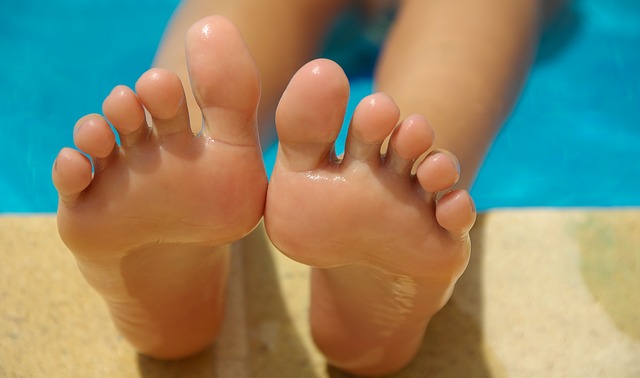This week Dr Roarty looks at one of the causes of painful burning feet.
Peripheral neuropathy describes damage to the nerves that connect your central nervous system – CNS – (i.e. your brain and spinal cord) and the rest of your body. Peripheral nerves carry information from your body to to your CNS ( eg to allow you feel hot and cold things) or from your CNS to your body ( eg to stimulate your muscles to move) or from your CNS to your organs (eg to keep your heart beatng). Problems with these nerves are quite common affecting about 2 in 100 people.
Damage can occur acutely and suddenly or more commonly over a period of time and is called chronic peripheral neuropathy. One or more nerves may be damaged.
What causes it?
There are a large number of causes. A common cause is Diabetes where high blood sugar levels damage nerves. Dietary deficiencies such as Vitamin B12 or folate also cause damage.
Certain medicines such as chemotherapy which is used to treat cancer as well as cancer itself can cause nerve damage.
Excessive alcohol intake is well known to damage to our peripheral nerves as well as certain toxins such as solvents (used by people who sniff glue).
Certain infections such as HIV and Lyme disease are also culprits as well as connective tissues diseases such as Rheumatoid Arthritis and Systemic Lupus Erythematosus.
There are some herditary diseases which cause peripheral neuropathy as well as some inflamatory conditions such as Coeliac disease and sarcoidosis.
Acute injuries such as broken bones or nerve compression injuries are also well recognised causes.
Sometimes no cause is ever identified.
Symptoms.
The symptoms depend on which type and how many nerves are affected.
Sensory neuropathy (where nerves which sense things are damaged) results in tingling and numbness in the part of the body affected. A person may lose the ability to sense pain, heat or cold and may have problems with co-ordination, because the brain has difficulty distinguishing where exactly the various parts of your body are in space. He or she may also suffer from burning or shooting pains which initially affect the hands or feet and are usually worst at night.
Motor neuropathy (where nerves supplying the muscles are affected) can cause muscle weakness, muscle wasting, twitching, cramps and eventually paralysis.
Neuropathy affecting the nerves supplying your organs can result in dizziness (due to low blood pressure) , sweating problems, incontinence, constipation, diarrhoea and erectile dysfunction.
What tests will the doctor do?
If your doctor suspects peripheral neuropathy either from the symptoms that you describe or at a routine checkup – eg at a diabetic review, he or she will usually inquire about your symptoms, your family history, your medicines, your alcohol intake and any poisonous substances that you may have been exposed to in the past. The doctor will examine you for any signs of peripheral neuropathy eg muscle weakness or difficulty sensing touch. Usually blood tests will also be required and if necessary you may be referred to a specialist in this area, called a neurologist, who may order further tests.
What is the treatment?
Treatment involves the management of any underlying conditions eg correcting vitamin b12 deficiency, or poor diabetic control or reducing alcohol intake, as well as symptom relief and help to achieve a good quality of life.
Some symptoms such as pain can be difficult to treat but certain types of medications can help. Some medications that are used to treat other conditions such as epilepsy or depression have also been found to be helpful in treating peripheral neuropathy.
Symptoms related to low blood pressure are treated with different medication while bowel or bladder problems are treated with different medicines again.
Physiotherapists and occupational therapists can help if peripheral neuropathy is causing muscle weakness. Certain exercises and aids may be of help. Numbness and an inability to feel pain means that care must be taken not damage or hurt the hands or feet unintentionally.
Wearing supportive shoes and avoiding things like hot water bottles as well as careful and regular examination of the feet for injuries will also help.
The prognosis?
Early detection and treatment has a better prognosis than late. However in severe neuropathy the damage may be permanent.
Avoiding excessive alcohol and a healthy balanced diet with good weight control and regular exercise will help prevent some of the causes of peripheral neuropathy.
The above information is intended as advice only and should you have any concerns please contact your own Doctor.
Dr Ciarán Roarty MB, BCh BAO MICGP DRCOG Grad. Cert. Obst. Ultrasound is a full-time GP at Scally McDaid Roarty Medical Practice , Scally Place, Letterkenny, Tel 0749164111
scallys.ie






